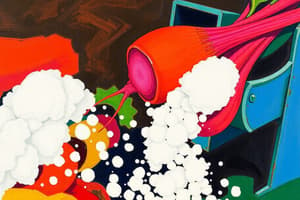Podcast
Questions and Answers
What is the primary purpose of clarification in sugar processing?
What is the primary purpose of clarification in sugar processing?
- To produce bioethanol from sugarcane juice
- To seed the juice with sugar crystals
- To remove excess water from the extracted juice
- To remove impurities and clarify the juice (correct)
What is the by-product of sugar processing used as animal feed or in the production of ethanol?
What is the by-product of sugar processing used as animal feed or in the production of ethanol?
- Bagasse
- Refined sugar
- Molasses (correct)
- Raw sugar
Which of the following is NOT a step in sugar processing?
Which of the following is NOT a step in sugar processing?
- Crystallization
- Filtration (correct)
- Drying
- Harvesting
What is the purpose of centrifugation in sugar processing?
What is the purpose of centrifugation in sugar processing?
What is produced after further processing and purification of raw sugar?
What is produced after further processing and purification of raw sugar?
What is the fibrous residue remaining after juice extraction from sugarcane used for?
What is the fibrous residue remaining after juice extraction from sugarcane used for?
What is the purpose of evaporation in sugar processing?
What is the purpose of evaporation in sugar processing?
What is the energy production method used by many sugar processing plants?
What is the energy production method used by many sugar processing plants?
Flashcards are hidden until you start studying
Study Notes
Sugar Processing Overview
- Sugar processing involves the extraction of sugar from sugarcane or sugar beets, followed by purification and crystallization to produce refined sugar.
Steps in Sugar Processing
- Harvesting: Sugarcane or sugar beets are harvested and transported to the processing plant.
- Extraction: Juice is extracted from sugarcane or sugar beets using a machine called a juicer or through diffusion.
- Clarification: The extracted juice is treated with lime to remove impurities and clarify the juice.
- Evaporation: The clarified juice is heated to remove excess water and concentrate the sugar content.
- Crystallization: The concentrated juice is then seeded with sugar crystals, allowing sugar crystals to form.
- Centrifugation: The resulting mixture of sugar crystals and mother liquor is separated using centrifuges.
- Drying: The sugar crystals are dried to remove any remaining moisture.
Types of Sugar Produced
- Raw sugar: Produced after crystallization, it contains impurities and moisture.
- Refined sugar: Produced after further processing and purification of raw sugar.
By-Products of Sugar Processing
- Molasses: A thick, dark liquid produced during the crystallization process, used as animal feed or in the production of ethanol.
- Bagasse: The fibrous residue remaining after juice extraction from sugarcane, used as fuel or in paper production.
Energy Production in Sugar Processing
- Cogeneration: Many sugar processing plants generate electricity and heat using bagasse and other biomass sources.
- Bioethanol production: Some sugar processing plants produce bioethanol from sugarcane juice or molasses.
Sugar Processing Overview
- Sugar is extracted from sugarcane or sugar beets, followed by purification and crystallization to produce refined sugar.
Steps in Sugar Processing
- Sugarcane or sugar beets are harvested and transported to the processing plant for extraction.
- Juice is extracted using a machine called a juicer or through diffusion.
- Lime is used to remove impurities and clarify the juice.
- The clarified juice is heated to remove excess water and concentrate the sugar content.
- Sugar crystals are formed by seeding the concentrated juice with sugar crystals.
- Centrifuges are used to separate the sugar crystals from the mother liquor.
- The sugar crystals are dried to remove any remaining moisture.
Types of Sugar Produced
Sugar Products
- Raw sugar is produced after crystallization and contains impurities and moisture.
- Refined sugar is produced after further processing and purification of raw sugar.
By-Products of Sugar Processing
- Molasses is a thick, dark liquid produced during crystallization, used as animal feed or in ethanol production.
- Bagasse is the fibrous residue remaining after juice extraction from sugarcane, used as fuel or in paper production.
Energy Production in Sugar Processing
- Many sugar processing plants generate electricity and heat using bagasse and other biomass sources through cogeneration.
- Bioethanol is produced from sugarcane juice or molasses in some sugar processing plants.
Studying That Suits You
Use AI to generate personalized quizzes and flashcards to suit your learning preferences.




